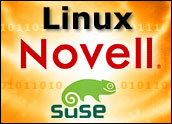
Novell on Tuesday announced that it has completed testing its Suse Linux Enterprise Server 10 with SAP’s NetWeaver and MySAP business suite applications.
The Suse Linux Enterprise Server 10, available since July, was tested jointly by Novell and SAP engineers in SAP’s LinuxLab in Germany.
Using Intel-based server hardware provided by IBM, the tests were designed to measure both stability and scalability when running SAP software on the Suse Linux Enterprise Server in a Xen paravirtualized datacenter environment.
Safe for Deployment
During the tests, server utilization levels reached over 70 percent, according to Novell.
The company said its server met or exceeded SAP’s performance requirements for its applications in a virtualized environment.
The tests verify that customers can deploy SAP applications in a virtualized environment using Suse Linux Enterprise Server, Novell said.
“More than 70 [percent] is certainly a good return on your investment in hardware,” Kevan Barney, Novell spokesperson, told LinuxInsider. “The point of the testing is to show that … those applications virtualized on that server still can run with good performance.”
Consolidate to Cut Costs
Virtualization of the IT infrastructure for SAP deployments can be advantageous for businesses, Novell noted, enabling the consolidation of workloads onto fewer servers for reduced capital and management costs.
“By integrating Xen into Suse Linux Enterprise Sever, Novell has made virtualization ‘real’ for customers,” said Roger Levy, vice president and general manager of open platform solutions for Novell. “SAP is a key component of its customers’ IT infrastructures, and SAP has very high standards for performance.”
Catching Up
Certification with a wider product range will help Suse remain competitive, Illuminata Senior Analyst Gordon Haff pointed out.
“For enterprise applications — whether you’re talking SAP, Oracle, IBM software group — buyers want their operating systems to be certified against those applications,” Haff told LinuxInsider. “If SAP has not been certified, and you run it on Brand X’s operating system, if something doesn’t work and you call SAP up, the first thing that SAP is going to ask is, ‘What OS are you running it on?’ If it’s not certified, SAP is going to say, ‘Sorry, not supported, your problem.'”
Running official tests with SAP products is a vital step in catching up with competitors such as Red Hat, Haff added.
“For Suse, one of the things they’ve been working very hard on the last couple of years is increasing the number of applications that are certified on their enterprise product, because they really trailed Red Hat on a significant number of applications,” he concluded.



















































